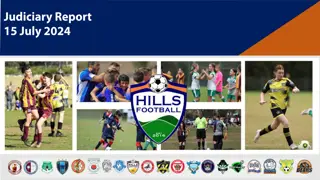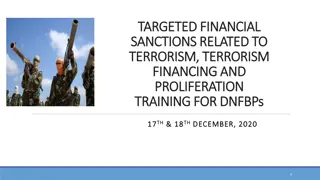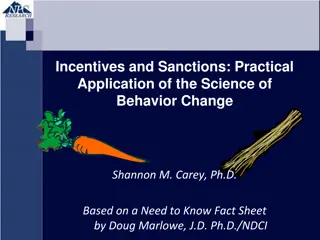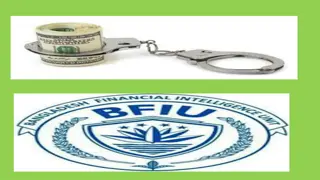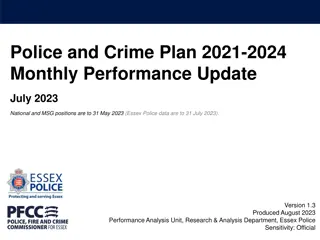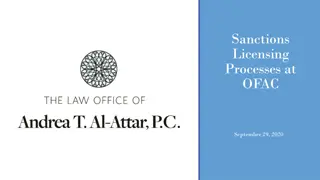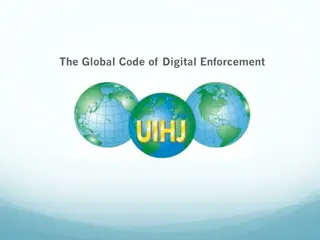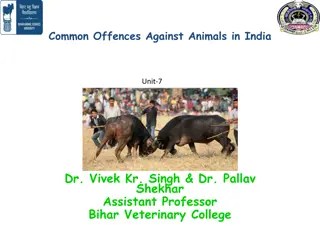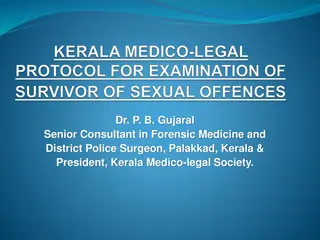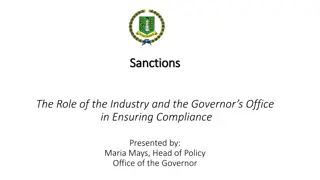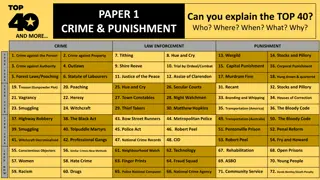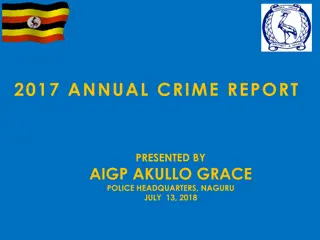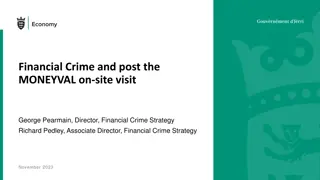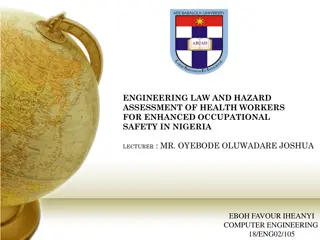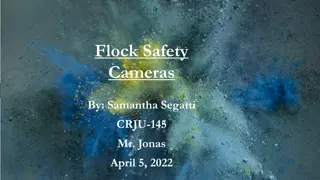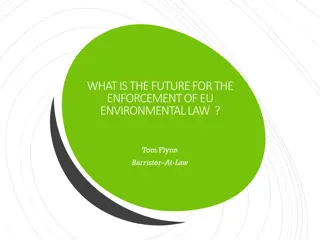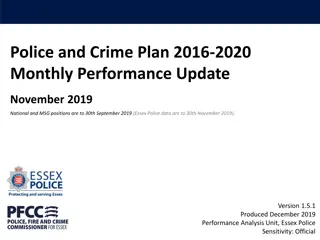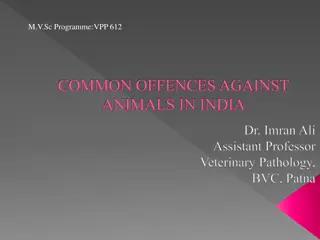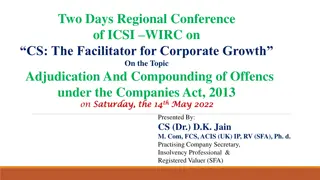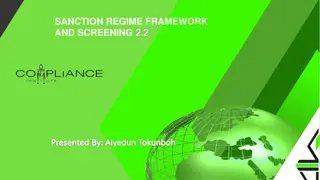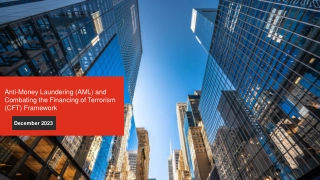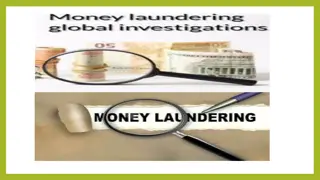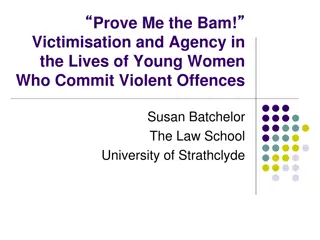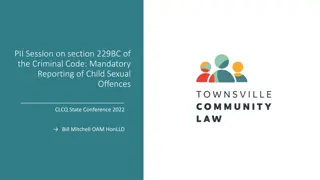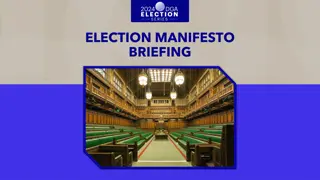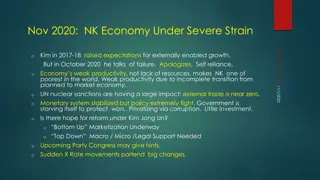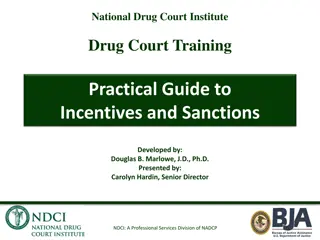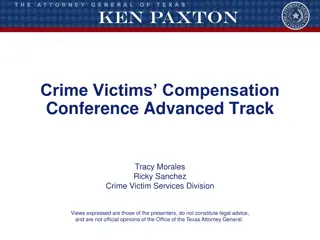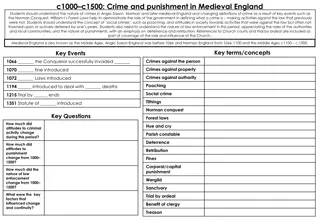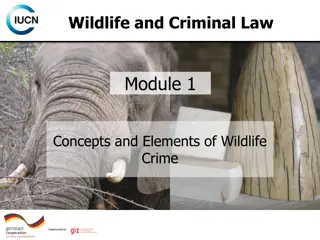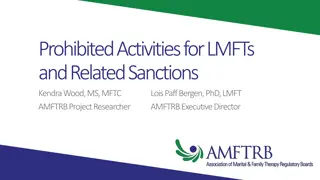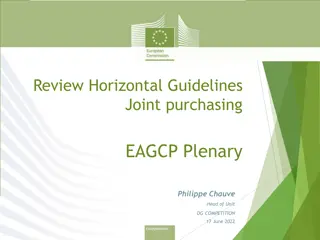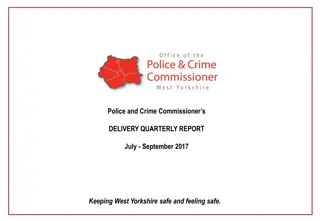UK Sanctions and Financial Crime: Interplay, Types, Enforcement, and Offences
The UK sanctions landscape post-Brexit, governed by the Sanctions and Anti-Money Laundering Act 2018, focuses on financial sanctions, human rights, anti-corruption measures, immigration, trade, and transport sanctions. The system allows for the issuance of licenses for specific activities under sanctions and is enforced by bodies like OFSI, NCA, ICU, CPS, SFO, HMRC, and sectoral regulators. Offences carry severe penalties, including imprisonment and hefty fines for non-compliance or breaches. Understanding these regulations is crucial to combating financial crime effectively.
Uploaded on Sep 16, 2024 | 0 Views
Download Presentation

Please find below an Image/Link to download the presentation.
The content on the website is provided AS IS for your information and personal use only. It may not be sold, licensed, or shared on other websites without obtaining consent from the author. Download presentation by click this link. If you encounter any issues during the download, it is possible that the publisher has removed the file from their server.
E N D
Presentation Transcript
Neither A Blade Or A Shield Neither A Blade Or A Shield The Interplay between UK The Interplay between UK Sanctions and Financial Sanctions and Financial Crime Crime Amanda Pinto KC 1
UK sanctions Post-Brexit The Sanctions and Anti-Money Laundering Act 2018 SAMLA amends the PCA 2017. It permits HM Treasury to impose monetary penalties for breaches of financial sanctions and provides the sanctions framework. The purposes of sanctions are political: 1. Compliance with UN obligations; 2. Compliance with another international obligation; or 3. Discretionary purpose. Conduct is caught if it takes place in UK or is by a UKPerson wherever located. 2
Types of UK sanctions under SAMLA Financial sanctions Human rights and anti-corruption ( Magnitsky ) sanctions Immigration sanctions Trade sanctions Transport sanctions Designation of a person and asset freeze 3
Licences Licenses permit activity otherwise prohibited by the sanction. A designated person may apply to OFSI for a licence fir a specified activity. Examples of licences are: For expenditure to meet basic needs of the designated person or dependants. For reasonable legal or professional fees. For payment required by court. 4
Enforcement Office for Financial Sanctions Implementation - OFSI National Crime Agency NCA s International Corruption Unit ICU Crown Prosecution Service CPS Serious Fraud Office SFO Her Majesty s Revenue & Customs - HMRC Sectoral regulators, e.g. the Prudential Regulation Authority PRA and Financial Conduct Authority (FCA) 5
Offences and Penalties A breach of the regulations is proved if there is: 1. A prohibited act; and 2. Knowledge, or reasonable cause to suspect, that the person was carrying out the prohibited act. Other offences include: failure to report, or providing false information to authorities, destruction of documents, confidentiality breaches, non-compliance with licences. Criminal: Ten years imprisonment and/or an unlimited financial penalty. Civil: Unlimited financial penalty. 6
Money Laundering & the Proceeds Of Crime Act 2002 - POCA Regimes Substantive ML offences Regulated Sector offences Confiscation of criminal property after financial crime proved Civil recovery orders Sentence: 14 years imprisonment and unlimited fines (high risk of custody for professionals) Suspicious Activity Report - SAR Defence Against Money Laundering SAR - DAML SARs have increased to approx. 62,000 2022-2023 7
Civil Forfeiture - AFOs and UWOs AFOs allow the NCA and SFO to apply to freeze, and subsequently forfeit, funds held in bank accounts and building societies. Civil proceedings: Account Freezing Order/Account Forfeiture Order - enforcement officer can apply to court if there are reasonable grounds for suspecting that money is: (1) recoverable; or (2) intended for unlawful conduct. - Very low bar to freeze assets - Very wide geographical reach Unexplained Wealth Order - where assets are disproportionate to income. 8
Regulated sector - Money Laundering Regulations 2017 Who is regulated? Professionals such as lawyers, auditors, accountants, financial institutions. Implement systems and controls to minimise the risk of ML: 1. Must obtain information about beneficial ownership of companies and trustees 2. Must cooperate with supervisory authorities 3. Regulatory authorities may share information for supervisory purposes Civil or criminal penalties for non-compliance 9
Fighting on numerous fronts? A SAR is required, what risks are you exposed to? 1. Forfeiture proceedings - POCA; 2. Breach of sanctions - SAMLA; 3. Criminal prosecution - POCA; 4. Regulatory action - e.g. MLR 2017; 5. Professional discipline or sectoral regulation - e.g. by FCA. Exposure to various outcomes, by more than one authority. 10
Self-reporting Trend towards requiring/encouraging businesses and professionals to report suspected crime: 1. Obligation on regulated sector to disclose suspicious conduct to authorities 2. SARs for ML offences 3. Deferred Prosecution Agreements and self reporting to the SFO 4. Register of Overseas Entities Risk of self reporting information sharing between UK agencies, including globally by MLA. 11
R (NCA) v Westminster Magistrates Court [2022] EWHC 2631 (Admin) - NCA obtained AFOs under POCA over A s accounts - A was a designated person under sanctions. - A obtained a licence from OFSI to pay for basic needs . - But the money in his accounts was frozen under the AFOs. - A applied to set the AFOs aside. - Judge refused but varied the AFOs to allow money for basic needs. - On appeal: A had failed to provide evidence that no other assets were available to meet expenses, so variation was wrongly granted. 12
AFOs and Sanctions different, different, different [The] decision of OFSI to grant a licence, and the decision of a court to make an exclusion from an AFO, are entirely distinct decisions, made by different kinds of bodies, for different purposes and with different effects. A Treasury licence is not a blade for hollowing out AFOs, and the sanctions regime is not a shield for protecting 'other assets . 13


